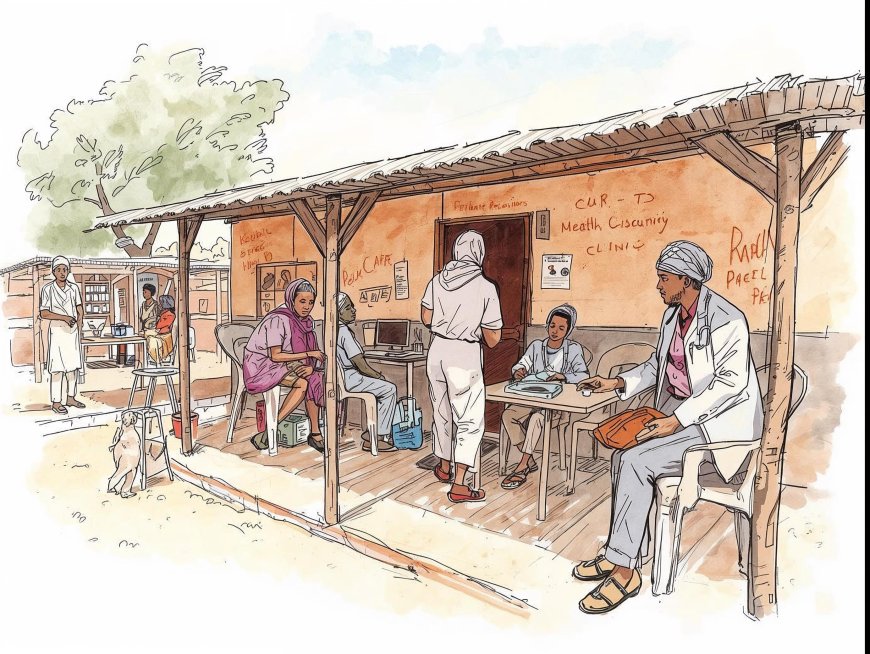Leveraging Medical and Healthcare Education for Entrepreneurship in Sub-Saharan Africa
This article explores how individuals with medical or healthcare education can create meaningful self-employed ventures in resource-constrained regions like Sub-Saharan Africa (with a focus on Kenya). It outlines step-by-step strategies, practical examples, and free tools to help health professionals launch impactful enterprises serving community health needs.

Introduction: Challenges and Opportunities
Sub-Saharan Africa bears a disproportionately heavy health burden yet has too few health workers to match it. The region has about 25% of the world’s disease burden but only ~3% of the global healthcare workforce[1]. Paradoxically, many trained health professionals are unemployed because public budgets cannot absorb them[2]. At the same time, African youth are highly entrepreneurial: roughly one in five working-age Africans starts a new business[3]. This gap – high health need and low formal employment – creates an opportunity. Individuals with medical or health education can use their skills to create sustainable, community-focused businesses that both earn income and improve care[1][3].
Turning Healthcare Training into Impact
Healthcare graduates (doctors, nurses, pharmacists, etc.) possess specialized knowledge of local health challenges. By identifying unmet needs – for example, common illnesses lacking affordable treatment or preventive education gaps – health professionals can design services or products to fill those gaps. For instance, one Kenyan program (Healthy Entrepreneurs) trains community health workers (CHWs) to become “health entrepreneurs” by giving them business training, a small loan, and a mobile phone to order and sell health products in their villages[4]. In this model, CHWs use their health training to stock and distribute medicines and health kits, earning income while expanding care. Similarly, a Kenyan nursing student founded Bena Care after seeing many hospital patients with non-urgent needs. She launched an at-home care service, training nurses and even family members to provide wound care and simple treatments at a fraction of hospital cost[5]. This venture (Bena Care) “transformed healthcare access in Kenya” by decongesting hospitals and employing new nurses[5]. These examples show that medical knowledge can be turned into practical services – from running mobile clinics or telehealth platforms, to launching health education workshops or low-cost medical supply businesses – all tailored to local conditions.
Step-by-Step Guide to Launch Your Health Venture
- Identify a Local Health Need: Start by observing your community or clinical setting. Talk to patients and caregivers to find common problems (e.g. many people visit hospitals for basic care, or mothers lack nutrition advice). Spot inefficiencies: for example, one founder noticed patients receiving expensive IVs for simple wounds[5]. This insight became her business. By pinpointing a need you personally understand, your health background gives you a head start on solutions.
- Brainstorm Solutions: Based on the need, consider services or products you could provide. Possibilities include a neighborhood clinic, telemedicine service, health education classes, maternal/child health programs, mobile pharmacy, or even a health-focused tech app. Choose an idea that matches your skills and passion. Research existing models – for instance, community CHWs selling health kits[4] or nurse-led homecare agencies[5] – and think how to adapt them to your area.
- Acquire Business and Technical Skills: Even with clinical expertise, you’ll need basic business knowledge. Take advantage of free online courses and resources: for example, the Alison platform offers free entrepreneurship courses covering business planning, marketing, and finance[6]. Health professionals should also refresh with MOOCs on topics like public health, telemedicine, or nutrition (NIH’s Fogarty Center lists many free global health training modules and webinars[7]). Combining these can help you craft a solid plan.
- Write a Simple Business Plan: Outline your service or product, target market, and how you’ll deliver value. Use templates (many free examples are online) to list required resources (equipment, supplies, space), costs, and pricing. Consider logistics: e.g. if you’ll deliver medicines, factor transport; if offering teleconsulting, decide on platforms (see Tools below). Even a basic plan helps clarify steps and makes it easier to seek partners or small loans.
- Leverage Free Digital Tools: You don’t need expensive software to start. Many open-source platforms can run your operations. For example, Odoo (community edition) is an ERP that lets you manage billing, inventory, and even patient records at no cost[8]. DHIS2 is a free health management information system (used in Kenya and dozens of countries) for tracking diseases and clinics[9]. Jitsi Meet offers free video conferencing (even on 3G internet) for telehealth consultations[10]. LibreHealth/OpenMRS provides open-source electronic health record software customizable for your clinic or program[11]. These tools mean you can handle logistics, data, and patient interactions without software subscriptions.
- Get Support and Mentoring: Look for local programs or networks that support entrepreneurs. In Kenya, there are youth entrepreneurship hubs, SME incubators, and non-profits (e.g. GIZ or Village Capital programs) that offer training, mentorship, or even seed grants. Join online forums and LinkedIn groups for health entrepreneurs. Facebook groups or associations of clinicians may connect you with mentors. Free platforms like WordPress or Canva can help create a basic website or promotional materials for your venture.
- Start Small and Iterate: Pilot your idea on a small scale before expanding. For instance, offer services to a few neighbors or through a local clinic partnership. Collect feedback and refine your approach. Use low-cost marketing: word of mouth, community gatherings, or social media. Track what works (patient satisfaction, costs) and adjust. Because you’re leveraging low-cost tools and your existing skills, you can grow gradually.
- Expand and Hire Others: As your venture gains traction, reinvest profits to improve services or scale up. You might eventually hire other healthcare workers or train community members (as Bena Care did by training family caregivers for home patients[12]). Creating jobs for nurses or CHWs not only grows your business but also multiplies the social impact. Eventually, you may form cooperatives or new companies that draw more people into health entrepreneurship.
Real-World Examples
· Healthy Entrepreneurs (Kenya): A non-profit program that turns rural community health workers into micro-entrepreneurs. Participants receive business training, a small loan, and a mobile phone to order and sell essential health products. This model lets CHWs run local health shops, earning income while expanding access to medicines[4].
· Bena Care (Kenya): Founded by a nursing student who saw chronic hospital overcrowding, Bena Care offers home-based nursing care for non-emergency patients. It employs new nurses and even trains patient family members to assist with wound care and monitoring. Its homecare service made healthcare more affordable and relieved pressure on hospitals[5].
· Zuri Health (Kenya): A digital health platform that provides doctor consultations via app, SMS, and WhatsApp. Patients can chat with doctors, order lab tests, and receive home delivery of medicines. Notably, Zuri offers basic consultations by SMS for users without smartphones, addressing the 65% of Kenyans with only feature phones[13].
· Whispa Health (Nigeria): A mobile application developed by a Nigerian team to deliver private telemedicine consultations and quality sexual health education to youth. Whispa users get balanced contraceptive counseling and can anonymously book appointments, all through their phones[14]. (This illustrates how medical training can be used to build tech solutions for health needs.)
These examples – from community-based vendors to tech startups – demonstrate that with creativity and local focus, health professionals can found successful enterprises that improve care in underserved areas[4][5].
Free Tools and Resources
- Open-Source Software: Utilize free digital platforms to run your venture. For example, Odoo (community edition) lets you manage billing, inventory, CRM and more without cost[8]. DHIS2 can track patient data and health indicators across clinics[9]. LibreHealth provides customizable electronic health record systems for clinics[11]. Communication tools like Jitsi Meet enable secure, no-cost telemedicine video calls[10]. Inventory management (e.g. OpenBoxes) and cloud services (e.g. Nextcloud) also have free editions suitable for small health startups. Using these tools keeps overhead low while maintaining professionalism.
- Online Learning Platforms: Enhance your skills through free courses. Platforms like Alison offer cost-free entrepreneurship and business courses covering planning, marketing, and finance[6]. The NIH Fogarty Global Health portal lists numerous free training modules and webinars on medical and public health topics[7]. African-focused resources like the Africa Health OER Network (Open Educational Resources) provide free health education materials and support curricula development[15]. Even large universities (Harvard, Coursera) allow auditing health and business courses for free. Use these courses to learn skills in demand – for example, how to write a business plan or design public health interventions – before investing in your venture.
- Business and Innovation Networks: Engage with communities and programs that support startups. Many NGOs, development agencies (e.g. GIZ, USAID), and incubators in Kenya run free training workshops or mentorship programs for young entrepreneurs. Online, join forums or social-media groups for health entrepreneurs in Africa. Websites like kaggle (for data science) or Stack Overflow (for tech issues) can solve technical problems. Also, use free marketing channels: set up a Facebook Page or WhatsApp group to reach patients, and list your services on local digital classifieds. Connecting with like-minded entrepreneurs and mentors is a resource in itself and often free.
Conclusion: A Path Forward
In resource-constrained regions, turning medical training into self-employment can both create livelihoods and fill vital health gaps. By following practical steps – identifying needs, planning, using free tools, and learning online – health professionals can launch social enterprises suited to their communities. As the McKinsey report notes, investing in Africa’s health workers can dramatically improve outcomes[1]. Individuals have already shown it works: Kenyan health graduates are founding clinics, digital health platforms, and community pharmacies that serve rural areas and generate income[4][5]. With the abundance of free resources today, motivated health workers can innovate “little by little” (as the Kenyan proverb goes) and ultimately build sustainable, impactful businesses that benefit all[1][4].
Sources: Insights and data are drawn from health workforce studies and entrepreneurial case reports[1][3], field examples (e.g. Bena Care[5], Healthy Entrepreneurs[4], Zuri Health[13], Whispa[14]) and published guides on open-source tools and free courses[8][11][6][7]. These references illustrate how healthcare training can seed innovative self-employment in African contexts.
[1] [2] Sub-Saharan Africa’s healthcare worker shortage | McKinsey
[3] Entrepreneurship and structural transformation - Foresight Africa 2024 | Brookings
[4] Visions of Community Health and the Social Good in Kenya: Turning Community Health Workers into Entrepreneurs
[5] [12] Transforming Healthcare in Kenya Through Homecare: Why We Invested in Bena Care
[6] Free Online Entrepreneurship Courses | Alison
https://alison.com/tag/entrepreneurship
[7] [15] E-learning Resources for Global Health Researchers - Fogarty International Center @ NIH
https://www.fic.nih.gov/Global/Pages/training-resources.aspx
[8] [9] [10] [11] Open-Source Tools Every Health Startup Should Know: From Hustle to Healing - The HealthPreneur – Africa’s Voice for Digital Health, Innovation & Medical Entrepreneurship
https://magazine.doctorsexplain.net/open-source-tools-every-health-startup-should-know
[13] Zuri Health is a startup from FFA's healthtech portfolio
https://www.foundersfactory.africa/portfolio/zuri-health
[14] Social entrepreneurs: health equity in Sub-Saharan Africa | World Economic Forum
What's Your Reaction?
 Like
0
Like
0
 Dislike
0
Dislike
0
 Love
0
Love
0
 Funny
0
Funny
0
 Angry
0
Angry
0
 Sad
0
Sad
0
 Wow
0
Wow
0

















































































